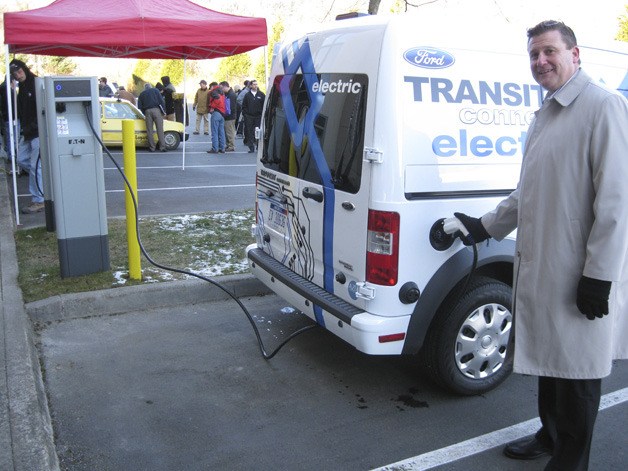Auburn is plugging into new technology in a drive toward clean-air transportation.
The latest flip of the switch comes from Eaton Corporation, a diversified power management and global technology company. At its south Auburn satellite facility last Friday, the company unveiled two high-speed electric vehicle chargers.
Eaton’s Level two commercial charging stations are equipped with a 220-volt plug that fully restores an electric vehicle’s depleted battery in four to six hours.
The charging station, at 1604 15th St. SW, is accessible to the public at no cost.
Eaton’s efforts follow Auburn-based Torr Technologies, which installed its first EV (electric vehicle) charger last month at its plant, 1435 22nd St. NW.
Eaton officials joined industry leaders and city dignitaries to usher in the new charging stations at the public ceremony last week. The chargers are part of Eaton’s range of products and services that will provide critical infrastructure for EV corridors in the Northwest and across North America.
“I am pleased to welcome and congratulate Eaton on the installation of their electric vehicle charging stations,” said Mayor Pete Lewis. “It is the start of new technology. What better place to usher in the new technology than Auburn?”
Eaton plans to expand the possibilities in years to come.
“It’s coming very quickly, and these are the first (stations),” said Wes Wuerch, area sales manager for Eaton. “This important collaboration with the City of Auburn will promote sustainability by creating the infrastructure that will help drivers become more confident that they can easily charge their electric vehicles.
“Eaton’s proven technology is helping to advance the aggressive early adoption of clean transportation in the Puget Sound region,” Wuerch said. “We are very committed to the industry … as (Gov. Chris Gregoire) stated … within the next 10 years there will be 300,000 electric vehicles in the state. That being the case, we are very committed to that industry … to clean energy and clean transportation.”
Gregoire, an Auburn native, praised Eaton’s latest milestone in a letter:
“I have no doubt that electric vehicles are the way of the future,” she wrote. “Soon, plugging into a recharging station will be no more unusual than pulling up to a pump is today.”
For more than 20 years, Eaton has developed electrical and hybrid power systems for trucks and buses and is now developing solutions for hybrid power systems in commercial vehicles.
Ford leading the way
The Ford Motor Co. has joined the EV efforts, trying to take the lead in a partnership with Azure Dynamics to develop and integrate proprietary electric and hybrid electric drive technology, primarily for light- and heavy-duty commercial vehicles.
A new Ford Transit Connect Electric fleet passenger van by Azure Dynamics, as well as others electric vehicles, were powered and driven around the Eaton plant last week.
Auburn’s Scarff Ford serves as the designated EV dealer for King County.
“We’re excited about it,” said Way Scarff, third-generation owner and operator of the family business. “There’s a lot of challenges, but it’s something new, and we are proud being a part of it.”
“For me, it’s an interesting thing to see. … My grandfather came to Auburn and sold Model-T’s in 1922, and here it is, 2011, and we’re looking at electric vehicles and really something cutting edge.”
The charging stations are part of the bigger picture to power a potentially large EV market in years to come. EV industry leaders recognize the challenges, from steep startup costs and infrastructure obstacles to standardization and practicalities, but the alternative for cleaner renewable energy and transportation is the ultimate payoff.
“I think there’s going to be a big push,” said Ivan Workman, business development manager for Electric Vehicle Support, a Eaton-certified contractor that installed the charging equipment at the Auburn plant.
Workman, who has been in the EV industry for 14 years, foresees bigger and better things for the industry.
“Battery packs are going to get much larger,” he said for example. “And you’re going to see vehicles with much longer ranges.”
The latest charging stations actually are Workman’s brainchild. He helped develop a similar project for the City of Redmond.
As Wuerch pointed out, EV industry efforts are primarily poised on commercial usage now, but more residential products are beginning to emerge.
“As time goes by, more and more households will be able to plug in their cars at home,” said one support technician.
For more information, visit www.eaton.com.



